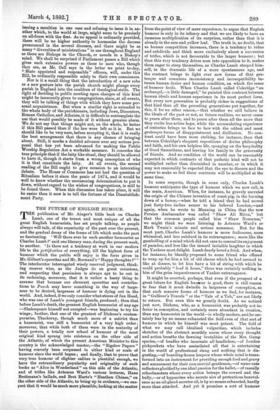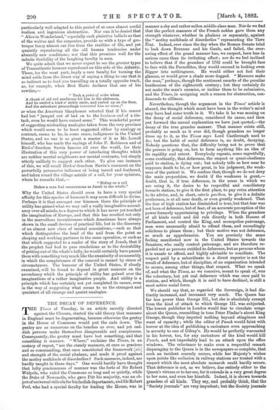THE FUTURE OF ENGLISH HUMOUR.
THE publication of Mr. Ainger's little book on Charles Lamb, one of the truest and most unique of all the great English humourists, has set people talking, as people always will talk, of the superiority of the past over the present, and the gradual decay of the forms of life which make the past so fascinating. Will there ever be such another humourist as Charles Lamb ?' said one literary man, during the present week, to another. Is there not a tendency at work in our modern life to the pettification of everything, till the highest form of humour which the public will enjoy is the form given in Mr. Gilbert's operettas and Mr. Buraand's " Happy thoughts ?" ' The interlocntor interrogated wisely reserved judgment, think- ing reserve wise, as the Judges do on great occasions, and suspecting that pessimism is always apt to be out in its reckoning, moreover, that it is rather a hasty thing to assume that because our cleverest operettas and contribu- tions to Punch may leave something in the way of large- ness to be desired, largeness of humour is dying out in the world. And, indeed, if we only consider what stores of fun Hood, who was one of Lamb's youngest friends, produced ; then that before Lamb's death, the greatest English humourist of any age —Shakespeare himself not excepted—was beginning to try his wings ; further, that one of the greatest of Dickens's contem- poraries, Thackeray, though much more of a satirist than a humonrist, was still a humourist of a very high order ; moreover, that while both of them were in the maturity of their powers, a totally new school of humour of the most original kind sprang into existence on the other side of the Atlantic, of which the present American Minister to this country is the acknowledged master,—the "Bigelow Papers" having scarcely been surpassed in either kind or scale of humour since the world began ; and finally, that to prove that very true humour of slighter calibre is plentiful enough, we have the extraordinary popularity and originality of such books as "Alice in Wonderland" on this side of the Atlantic, and of trifles like Artemus Ward's various lectures, Hans Breitmann's ballads, and Bret Harte's "Heathen Chines," on the other side of the Atlantic, to bring up in evidence,—we sus- pect that it would be much more plausible, looking at the matter
from the point of view of mere experience, to argue that English humour is only in its infancy and that we are likely to have an immense multiplication of its surprises, rather than that it is already in the sere and yellow leaf. The truth is, no doubt, that as human competition increases, there is a tendency to refine and subdivide and think more exclusively about a succession of trifles, which is not favourable to the larger humour ; but then this very tendency drives men into opposition to it, makes them eager to steep themselves, as Charles Lamb steeped him- self, in the dramatic life of a more spontaneous age, and the contrast brings to light ever new forms of that gro- tesque and conscious inconsistency and incompatibility be- tween human desire and human condition, on which the sense of humour feeds. When Charles Lamb called Coleridge "an archangel,—a little damaged," he painted this contrast between human ideals and human experience in its most perfect form. But every new generation is probably richer in suggestions of that kind than all the preceding generations put together, for this, if for no other reason,—that whether we still believe in the ideals of the past or not, as future realities, we never cease to yearn after them, and to yearn after them all the more that they excite less active hope, while the accumulating experience of centuries brings us face to face with the oddest and most grotesque forms of disappointment and disillusion. No con- trast could have been more striking, for instance, than that between Coleridge's eloquent expositions of divine philosophy and faith, and his own helpless life, sponging on the hospitality of Good Samaritans, and leaving his family to the generosity of friends. And no condition of the world can be reasonably expected in which contrasts of that pathetic kind will not be multiplied rather than diminished in number, or in which it may not reasonably be expected that the eye to discern and the power to make us feel these contrasts will be multiplied at the same time.
In some respects, though in some only, Charles Lamb's humour anticipates the type of humour which we now call, in the main, American. When, for instance, he gravely narrated the origin of the Chinese invention of roast pig, in the burning down of a house,—when he told a friend that he had moved just forty-two inches nearer to his beloved London,—and again, when he wrote to Manning in China that the new Persian Ambassador was called " Shaw All Mirza," but that the common people called him " Shaw Nonsense," we might think we were listening to Artemus Ward's or Mark Twain's minute and serious nonsense. But for the most part, Charles Lamb's humour is more frolicsome, more whimsical, and less subdued in its extravagance ; more like the gambolling of a mind which did not care to conceal its enjoyment of paradox, and less like the inward invisible laughter in which the Yankees most delight. Lamb dearly loved a frisk. And when,
fur instance, he blandly proposed to some friend who offered to wrap np for him a bit of old cheese which he had seemed to like at dinner, to let him have a bit of string with which he could probably " lead it home," there was certainly nothing in him of the grim impassiveness of Yankee extravagance.
It might be asserted, perhaps, that even if the prospect of a great future for English humour is good, there is still reason to fear that it must dwindle in largeness of conception, so that such massive forms of humour as we find, for instance, in " Gulliver's Travels " or the " Tale of a Tub," are not likely to return. But even this we greatly doubt. As we noticed just now, Dickens, who, as a humourist was probably not in- ferior in conception, and certainly more abundant in creation, than any humourist in the world—is wholly modern, and he cer- tainly has by no means exhausted the field even of that sort of humour in which he himself was most potent. The field of
what we may call idealised vulgarities, which includes sketches of the abstract monthly nurse whose every thought and action breathe the fawning brutalities of the Mrs. Gamp species,—of beadles who incarnate all beadledom,—of London pickpockets who have assimilated all that is entertaining in the world of professional slang and nothing that is dis- gusting,—of boarding-house keepers whose whole mind is trans- formed into an instrument for providing enough food and gravy and amusement for their commercial gentlemen,—of water-rate collectors glorified by one ideal passion for the ballet,—of rascally schoolmasters whose every action betrays the coward and the bully,—or of hypocrites who secrete airs of pretentious benevol- ence as an oil-gland secretes oil, is by no means exhausted, hardly more than attacked. And yet it promises a sort of humour
particularly well adapted to this period of at once almost sordid realism and ingenious abstraction. Nor can it be denied that " Alice in Wonderland," especially such plaintive ballads as that of the walrus and the carpenter, provide us with a type of gro- tesque fancy almost cut free from the realities of life, and yet quaintly reproducing all the old human tendencies under absurdly new conditions; nor that this promises well for the infinite flexibility of the laughing faculty in man.
We quite admit that we never expect to see the greater types of Transatlantic humour reproduced on this side of the Atlantic. These, for the most part, imply a rare faculty for turning the mind aside from the direct way of saying a thing to one that is so indirect as to lead you travelling on a totally opposite track, as, for example, when Bret Harte declares that one of his rowdies,—
" Took a point of order when A chunk of old red sandstone hit him in the abdomen, And he smiled a kind o' sickly smile, and curled up on the floor, And the sabsekent proceedings interested him no more ;"
or when the American blasphemer retorted that if his censor had but " jumped out of bed on to the business end of a tin- tack, even he would have cursed some." This wonderful power of suggesting misleading analogies taken from the very province which would seem to be least suggested either by analogy or
contrast, seems to be, in some sense, indigenous in the United States, and no one is so great a master of it as Mr. Lowell himself, who has made the sayings of John P. Robinson and of Bird-o'-freedom Sawin famous all over the world, for their illustration of this very power of interlacing thoughts which
are neither mental neighbours nor mental contrasts, but simply
utterly unlikely to suggest each other. To give one instance of this, we will recall Bird-o'-freedum Sawin's comment on the powerfully persuasive influence of being tarred and feathered, and taken round the village astride of a rail, for your opinions, where he remarks that,—
"Riding on a rail Makes a man feel unanermous as Jonah in the whale."
Why the United States should seem to have a very special affinity for this species of humour it may seem difficult to divine. Perhaps it is that amongst our kinsmen there the principle of utility has gained what we may call a really imaginative ascend- ancy over all minds, to a degree to which it has never yet touched the imagination of Europe, and that this has resulted not only in the marvellous inventiveness which Americans have always shown in the small devices of practical life, but in the discovery of an almost new class of mental associations,—such as that which distinguishes the head of the nail from the point as sleeping and working partners in the same operation, or such as that which suggested to a reader of the story of Jonah, that if the prophet had had to pass resolutions as to the desirability of getting out of the whale's belly, he would certainly have passed them with something very much like the unanimity of an assembly in which the completeness of the concord is caused by stress of circumstances. The humour of the United States, if closely examined, will be found to depend in great measure on the ascendancy which the principle of utility has gained over the imaginations of a rather imaginative people. And utility is a principle which has certainly not yet completed its career, even in the way of suggesting what seems to us the strangest and quaintest of all strange and quaint analogies.



































 Previous page
Previous page